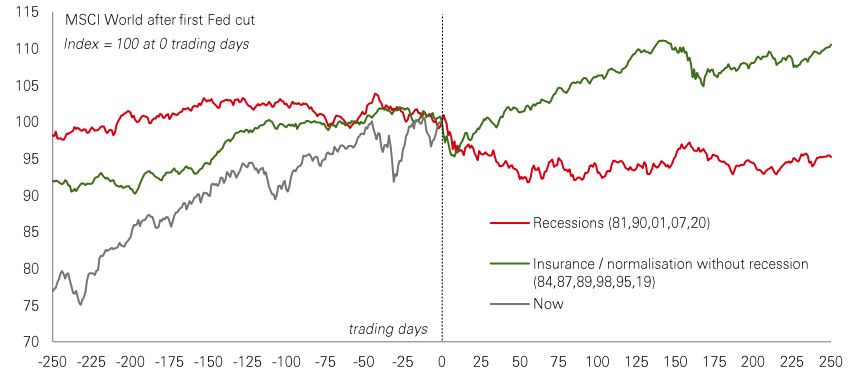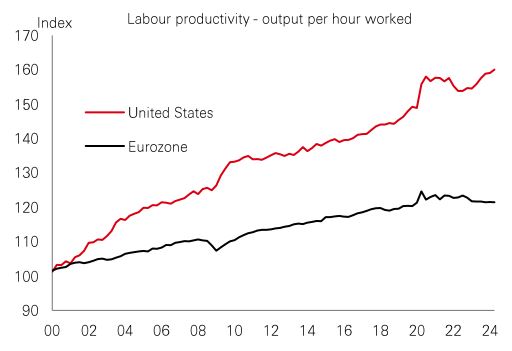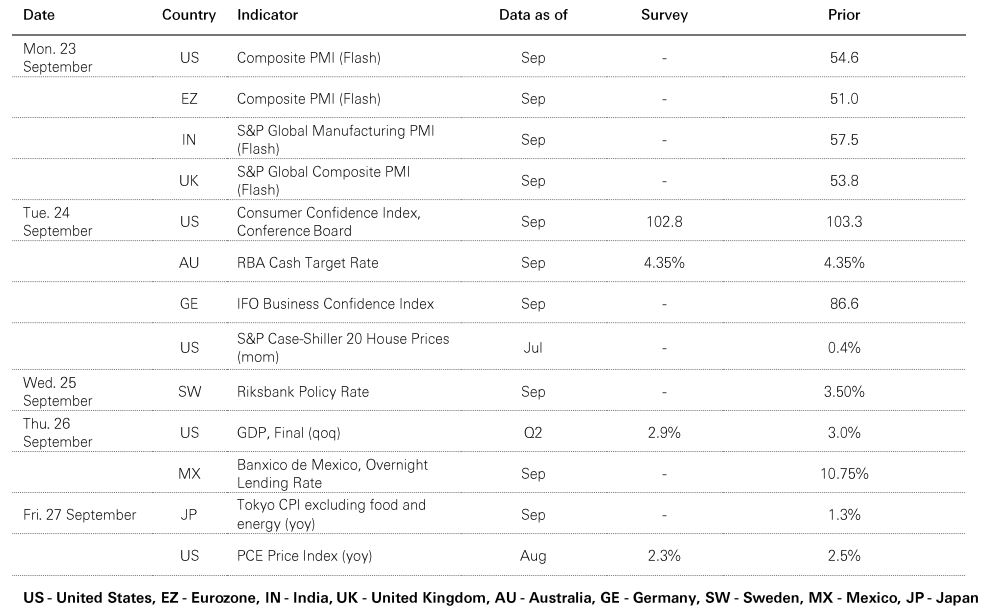
23 Sep 2024

With the market pricing in a high probability of an outsized rate cut, the Fed decided it could be bold and deliver a 0.50% move at its September meeting. It reflected greater confidence that inflation is now in the rear-view mirror, and it is time for the Fed to switch its focus to maximising the chances of a soft landing.
If delivered, the soft landing would be positive for risk assets. Globally, equities typically perform well in the year following the first Fed rate cut, so long as the US economy avoids a recession. The playbook for a soft landing is a ‘great rotation’ in markets, with value, small caps, and emerging markets outperforming while Treasury yields drift lower, the yield curve ‘structurally steepens’ and the USD weakens.
However, while the Fed has embarked on a cutting cycle, policy is likely to remain restrictive for some time yet. Combined with the current cooling trend in the labour market, this means recession risk could remain elevated heading into 2025. Additional sources of risk, such as election uncertainty or geopolitical stress, can also come into play. There could be a more volatile phase for investment markets. And if the much-vaunted soft landing turns into a hard landing, risk assets will struggle even if the Fed loosens policy by far more than currently expected.
Private credit has surged in popularity among investors in recent years. And with an average yield of nearly 12%, it continues to offer a return in excess of other credits, as well as the 9.5% average 10-year total return from stocks.
With traditional banks continuing to retreat from parts of the lending market – a trend evident since the financial crisis – private credit managers have stepped in. This has given both borrowers and lenders more flexibility on terms, with investors benefitting from the asset’s relatively low volatility and eye-catching returns.
New private credit fundraising slowed in 2023 and early 2024, with elevated rates putting pressure on some borrowers and reducing demand in places. But last week’s move by the US Fed to kick off its easing cycle could boost the environment for both fundraising and lending. And while lower base rates will inevitably trim returns over time, private credit is expected to remain a high yield asset class (on both an absolute and relative basis) – and one that offers an illiquidity premium that suits long-term investors. It also serves as a useful portfolio diversifier.
The value of investments and any income from them can go down as well as up and investors may not get back the amount originally invested. Past performance does not predict future returns. The level of yield is not guaranteed and may rise or fall in the future.
This information shouldn't be considered as a recommendation to buy or sell specific sector/stocks mentioned. Any views expressed were held at the time of preparation and are subject to change without notice. While any forecast, projection or target where provided is indicative only and not guaranteed in any way.
Source: HSBC Asset Management. Macrobond, Bloomberg. Data as at 11.00am UK time 20 September 2024.
As global policy easing accelerates, EM hard currency bonds are in a plum position. Although EM sovereign spreads remain historically tight, they have widened relative to DM high-yield spreads – a comparable asset class. This is puzzling given that EM sovereign bonds are a high-duration asset class, with average index duration nearly double that of global high yield and exceeding that of even US Treasuries.
And according to some EM debt analysts, the story around fundamentals is also very favourable. After a decade of ratings downgrades, EM sovereigns have turned a corner. Since early last year, upgrades net of downgrades have turned positive and continue to trend up. Turkey is notable among large EMs for its upgrade momentum. There have also been ratings improvements in several frontier markets, notably Azerbaijan, Paraguay, Morocco, Namibia, Costa Rica, the Dominican Republic, and Serbia. This furthers the structural shift towards a better-quality index with more investment grade ratings, implying the potential for superior returns with lower risks.

Indian stocks have outpaced most global markets this year, with the MSCI India index rising by 23%. After a bout of post-election volatility in Q2, foreign investment inflows have picked up in Q3, with investors gravitating to India’s relatively low dependence on external demand, expectations of policy continuity, and exposure to secular growth trends – especially in manufacturing, infrastructure, and consumption.
At the sector level, all areas have notched-up double-digit percentage gains this year. Communications and consumer discretionary have led with returns of 53% and 42% respectively. There have also been 25%-plus rises in the healthcare, industrials, utilities, and real estate sectors.
In terms of valuations, parts of the Indian market arguably look richly-priced. Small and mid-cap stocks, in particular, currently trade on a forward 12-month price-earnings ratio of 31.5x. But large-caps trade on a more modest 22.5x. Sector-wise, the valuations for financials are less stretched; healthcare, which is seeing multi-year demand growth; and real estate, which is benefitting from improving demand and supply dynamics.

A recent report by ex-European Central Bank president Mario Draghi into the EU’s poor competitiveness, has blamed a yawning EU/US productivity gap over the past 20 years.
The eurozone’s structural problems are well documented. Draghi mentions three: (1) low investment, outright and relative to the US; (2) the innovation gap with the US and China, with EU firms stifled by regulation, and (3) fragmented capital markets.
Draghi’s recommendations range from importing foreign technologies to completing a banking union and ensuring the green transition continues. The report estimates the additional investment needs a hefty Eur750-800bn per year (around 4.5% of EU GDP).
But implementation is a tall order given rising EU political fragmentation. Not only is Germany’s enthusiasm for joint bond issuance cooling but a new French government is unlikely to welcome further EU integration.

Past performance does not predict future returns. The level of yield is not guaranteed and may rise or fall in the future. This information shouldn't be considered as a recommendation to buy or sell specific sector/stocks mentioned. Any views expressed were held at the time of preparation and are subject to change without notice. Diversification does not ensure a profit or protect against loss. Source: HSBC Asset Management. Macrobond, Bloomberg, Datastream, BofA Global Research. Data as at 11.00am UK time 20 September 2024.


Source: HSBC Asset Management. Data as at 11.00am UK time 23 September 2024. This information shouldn't be considered as a recommendation to buy or sell specific sector/stocks mentioned. Any views expressed were held at the time of preparation and are subject to change without notice.
The Fed’s bold 0.50% rate cut boosted risk appetite, with credit spreads tightening. US Treasuries underperformed German Bunds, with the US yield curve steepening further on higher 10-year yields. Fed Chair Powell stated: “it is time to recalibrate policy”, with the FOMC’s median 2024 and 2025 interest rate expectations marked down by 0.75%. In the US, the S&P 500 powered to a fresh high, with the rate-sensitive Russell 2000 index also performing well. The Euro Stoxx 50 index posted strong gains, while Japan’s Nikkei 225 was boosted by a softer yen as the BoJ left policy on hold amid “high uncertainties”. In emerging markets, Hong Kong’s Hang Seng outperformed in a holiday-shortened week, and Brazil’s Bovespa index fell as the Banco de Brasil raised rates by 0.25%. In commodities, rising geopolitical tensions lifted oil prices. Gold reached an all-time high, and copper strengthened.





This document or video is prepared by The Hongkong and Shanghai Banking Corporation Limited (‘HBAP’), 1 Queen’s Road Central, Hong Kong. HBAP is incorporated in Hong Kong and is part of the HSBC Group. This document or video is distributed and/or made available, HSBC Bank (China) Company Limited, HSBC Bank (Singapore) Limited, HSBC Bank Middle East Limited (UAE), HSBC UK Bank Plc, HSBC Bank Malaysia Berhad (198401015221 (127776-V))/HSBC Amanah Malaysia Berhad (20080100642 1 (807705-X)), HSBC Bank (Taiwan) Limited, HSBC Bank plc, Jersey Branch, HSBC Bank plc, Guernsey Branch, HSBC Bank plc in the Isle of Man, HSBC Continental Europe, Greece, The Hongkong and Shanghai Banking Corporation Limited, India (HSBC India), HSBC Bank (Vietnam) Limited, PT Bank HSBC Indonesia (HBID), HSBC Bank (Uruguay) S.A. (HSBC Uruguay is authorised and oversought by Banco Central del Uruguay), HBAP Sri Lanka Branch, The Hongkong and Shanghai Banking Corporation Limited – Philippine Branch, HSBC Investment and Insurance Brokerage, Philippines Inc, and HSBC FinTech Services (Shanghai) Company Limited and HSBC Mexico, S.A. Multiple Banking Institution HSBC Financial Group (collectively, the “Distributors”) to their respective clients. This document or video is for general circulation and information purposes only.
The contents of this document or video may not be reproduced or further distributed to any person or entity, whether in whole or in part, for any purpose. This document or video must not be distributed in any jurisdiction where its distribution is unlawful. All non-authorised reproduction or use of this document or video will be the responsibility of the user and may lead to legal proceedings. The material contained in this document or video is for general information purposes only and does not constitute investment research or advice or a recommendation to buy or sell investments. Some of the statements contained in this document or video may be considered forward looking statements which provide current expectations or forecasts of future events. Such forward looking statements are not guarantees of future performance or events and involve risks and uncertainties. Actual results may differ materially from those described in such forward-looking statements as a result of various factors. HBAP and the Distributors do not undertake any obligation to update the forward-looking statements contained herein, or to update the reasons why actual results could differ from those projected in the forward-looking statements. This document or video has no contractual value and is not by any means intended as a solicitation, nor a recommendation for the purchase or sale of any financial instrument in any jurisdiction in which such an offer is not lawful. The views and opinions expressed are based on the HSBC Global Investment Committee at the time of preparation and are subject to change at any time. These views may not necessarily indicate HSBC Asset Management‘s current portfolios’ composition. Individual portfolios managed by HSBC Asset Management primarily reflect individual clients’ objectives, risk preferences, time horizon, and market liquidity.
The value of investments and the income from them can go down as well as up and investors may not get back the amount originally invested. Past performance contained in this document or video is not a reliable indicator of future performance whilst any forecasts, projections and simulations contained herein should not be relied upon as an indication of future results. Where overseas investments are held the rate of currency exchange may cause the value of such investments to go down as well as up. Investments in emerging markets are by their nature higher risk and potentially more volatile than those inherent in some established markets. Economies in emerging markets generally are heavily dependent upon international trade and, accordingly, have been and may continue to be affected adversely by trade barriers, exchange controls, managed adjustments in relative currency values and other protectionist measures imposed or negotiated by the countries with which they trade. These economies also have been and may continue to be affected adversely by economic conditions in the countries in which they trade. Investments are subject to market risks, read all investment related documents carefully.
This document or video provides a high-level overview of the recent economic environment and has been prepared for information purposes only. The views presented are those of HBAP and are based on HBAP’s global views and may not necessarily align with the Distributors’ local views. It has not been prepared in accordance with legal requirements designed to promote the independence of investment research and is not subject to any prohibition on dealing ahead of its dissemination. It is not intended to provide and should not be relied on for accounting, legal or tax advice. Before you make any investment decision, you may wish to consult an independent financial adviser. In the event that you choose not to seek advice from a financial adviser, you should carefully consider whether the investment product is suitable for you. You are advised to obtain appropriate professional advice where necessary.
The accuracy and/or completeness of any third-party information obtained from sources which we believe to be reliable might have not been independently verified, hence Customer must seek from several sources prior to making investment decision.
The following statement is only applicable to HSBC Mexico, S.A. Multiple Banking Institution HSBC Financial Group with regard to how the publication is distributed to its customers: This publication is distributed by Wealth Insights of HSBC México, and its objective is for informational purposes only and should not be interpreted as an offer or invitation to buy or sell any security related to financial instruments, investments or other financial product. This communication is not intended to contain an exhaustive description of the considerations that may be important in making a decision to make any change and/or modification to any product, and what is contained or reflected in this report does not constitute, and is not intended to constitute, nor should it be construed as advice, investment advice or a recommendation, offer or solicitation to buy or sell any service, product, security, merchandise, currency or any other asset.
Receiving parties should not consider this document as a substitute for their own judgment. The past performance of the securities or financial instruments mentioned herein is not necessarily indicative of future results. All information, as well as prices indicated, are subject to change without prior notice; Wealth Insights of HSBC Mexico is not obliged to update or keep it current or to give any notification in the event that the information presented here undergoes any update or change. The securities and investment products described herein may not be suitable for sale in all jurisdictions or may not be suitable for some categories of investors.
The information contained in this communication is derived from a variety of sources deemed reliable; however, its accuracy or completeness cannot be guaranteed. HSBC México will not be responsible for any loss or damage of any kind that may arise from transmission errors, inaccuracies, omissions, changes in market factors or conditions, or any other circumstance beyond the control of HSBC. Different HSBC legal entities may carry out distribution of Wealth Insights internationally in accordance with local regulatory requirements.
Important Information about the Hongkong and Shanghai Banking Corporation Limited, India (“HSBC India”)
HSBC India is a branch of The Hongkong and Shanghai Banking Corporation Limited. HSBC India is a distributor of mutual funds and referrer of investment products from third party entities registered and regulated in India. HSBC India does not distribute investment products to those persons who are either the citizens or residents of United States of America (USA), Canada, Australia or New Zealand or any other jurisdiction where such distribution would be contrary to law or regulation.
The following statement is only applicable to HSBC Bank (Taiwan) Limited with regard to how the publication is distributed to its customers: HSBC Bank (Taiwan) Limited (“the Bank”) shall fulfill the fiduciary duty act as a reasonable person once in exercising offering/conducting ordinary care in offering trust services/ business. However, the Bank disclaims any guarantee on the management or operation performance of the trust business.
The following statement is only applicable to PT Bank HSBC Indonesia (“HBID”): PT Bank HSBC Indonesia (“HBID”) is licensed and supervised by Indonesia Financial Services Authority (“OJK”). Customer must understand that historical performance does not guarantee future performance. Investment product that are offered in HBID is third party products, HBID is a selling agent for third party product such as Mutual Fund and Bonds. HBID and HSBC Group (HSBC Holdings Plc and its subsidiaries and associates company or any of its branches) does not guarantee the underlying investment, principal or return on customer investment. Investment in Mutual Funds and Bonds is not covered by the deposit insurance program of the Indonesian Deposit Insurance Corporation (LPS).
Important information on ESG and sustainable investing
Today we finance a number of industries that significantly contribute to greenhouse gas emissions. We have a strategy to help our customers to reduce their emissions and to reduce our own. For more information visit www.hsbc.com/sustainability.
In broad terms “ESG and sustainable investing” products include investment approaches or instruments which consider environmental, social, governance and/or other sustainability factors to varying degrees. Certain instruments we classify as sustainable may be in the process of changing to deliver sustainability outcomes. There is no guarantee that ESG and Sustainable investing products will produce returns similar to those which don’t consider these factors. ESG and Sustainable investing products may diverge from traditional market benchmarks. In addition, there is no standard definition of, or measurement criteria for, ESG and Sustainable investing or the impact of ESG and Sustainable investing products. ESG and Sustainable investing and related impact measurement criteria are (a) highly subjective and (b) may vary significantly across and within sectors.
HSBC may rely on measurement criteria devised and reported by third party providers or issuers. HSBC does not always conduct its own specific due diligence in relation to measurement criteria. There is no guarantee: (a) that the nature of the ESG / sustainability impact or measurement criteria of an investment will be aligned with any particular investor’s sustainability goals; or (b) that the stated level or target level of ESG / sustainability impact will be achieved. ESG and Sustainable investing is an evolving area and new regulations are being developed which will affect how investments can be categorised or labelled. An investment which is considered to fulfil sustainable criteria today may not meet those criteria at some point in the future.
THE CONTENTS OF THIS DOCUMENT OR VIDEO HAVE NOT BEEN REVIEWED BY ANY REGULATORY AUTHORITY IN HONG KONG OR ANY OTHER JURISDICTION. YOU ARE ADVISED TO EXERCISE CAUTION IN RELATION TO THE INVESTMENT AND THIS DOCUMENT OR VIDEO. IF YOU ARE IN DOUBT ABOUT ANY OF THE CONTENTS OF THIS DOCUMENT OR VIDEO, YOU SHOULD OBTAIN INDEPENDENT PROFESSIONAL ADVICE.
© Copyright 2024. The Hongkong and Shanghai Banking Corporation Limited, ALL RIGHTS RESERVED.
No part of this document or video may be reproduced, stored in a retrieval system, or transmitted, on any form or by any means, electronic, mechanical, photocopying, recording or otherwise, without the prior written permission of The Hongkong and Shanghai Banking Corporation Limited.